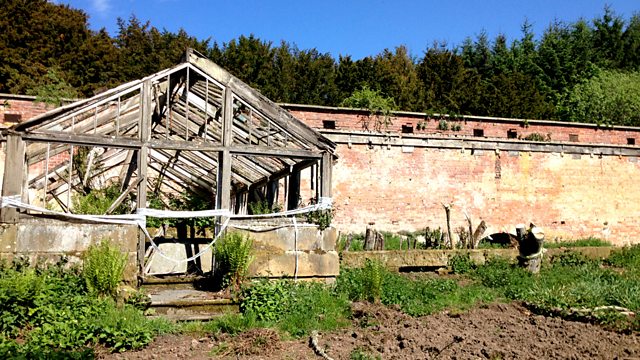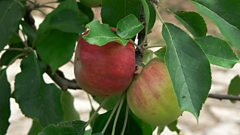Penicuik
Chaired by Eric Robson, the GQT team is in Penicuik, Midlothian. The panellists are Bob Flowerdew, Carole Baxter and Anne Swithinbank.
Chaired by Eric Robson, the GQT team is in Penicuik for this week's episode of Gardeners' Question Time. Taking the audience's questions are panelists Bob Flowerdew and Anne Swithinbank, along with guest panelist Carole Baxter.
Produced by Victoria Shepherd
A Somethin' Else Production for ����ý Radio 4.
For more information on The Lost Garden of Penicuik visit: www.lostgarden.co.uk
Q. What is the best way to store seed and how long should you keep bags of compost?
A. When storing seeds they need to be kept away from air, damp, heat and frost so it is best to use a sealed container for example a jam jar or a paper envelope and store in a shaded, frost free location. Fresh compost is usually best. If you keep compost for a long time changing weather conditions can affect the fertility however you can still find uses for it, such as topping up containers and beds towards the end of the year.
Q. What can I do to help celery grow in a cold and wet climate?
A. Celery is usually planted at the beginning of the year under cover. It needs to be sheltered from the wind, have continual moisture and very rich conditions and it must be protected from frost. A good idea is to put a box around it and fill it with sharp sand or leaf mould, which should keep it protected from frost. Another method would be to create a raised hot bed. Dig but some of the soil and put some well rotted horse manure in the bed followed by the soil on top, then plant the celery and place a fleece on top, this will induce some heat and keep some moisture off, helping the celery grow.
Q. How would you deal with impacted clay soil, whilst avoiding too much physical labour?
A. Clay is very rich and has a lot of nutrition but it is very hard to work with. One method of planting would be to put a layer of mulch on top and then plant through the mulch and let the roots break through the clay. The plants can then also use the nutrition of the clay. Also you could use some woven ground cover (geotextile), covering the area, after a year remove the cover and the ground should be suitable for planting.
Q. What do you think of the concept of perennial vegetables and would you be able to recommend any?
A. Asparagus, Sea Kale, a cross between cabbage and asparagus, and "Good King Henry" are all great and delicious options and all grow year after year with very little work needed. Asparagus can only be harvested for about eight weeks, let the rest of the spears grow and they can then go back into the ground to build up for the following year's crop. Kale is a hardy, flavoursome plant and should ideally be sown in spring, planted out in June and ready for cropping in the winter. Finally, Chinese artichoke has a lovely flavour; usually cropped in October it can be planted in the ground but is best undercover.
Q. My Prunus Aviums are showing signs of stress with poor growth and little to no flowering. My garden is at 800ft (240m) and exposed could this problem be due to climatic influences?
A. A possible diagnosis is a fungal disease called Blossom End Wilt. If this were the case the answer would be to cut out the diseased and damaged parts. A lack of magnesium in the soil could cause nutrient deficiency and therefore feeding them with a well-balanced feed or perhaps a seaweed spray with a lot of trace elements in them could help. Additionally, the stone fruit family do need a higher level of lime in the soil to grow so adding lime to the soil may help.
Q. What is the best way to grow and harvest an Angelica plant?
A. Avoid disturbing the soil around it and let some seed fall to the ground because it is very good at seeding itself if left undisturbed. Also collect some seed and sow it into a pan and leave it in the Greenhouse. For cooking, collect the stems before they flower, peel and boil in sugar syrup, let them sit in the syrup and then drain, for a great flavour repeat the boiling process over several days.
Q. My husband urinates in our garden; as a result the grass grows very healthily while the weeds seem to die. What elements in urine could cause this?
A. The grass family are all very responsive to nitrogen and are all able to cope with higher levels of nitrogen than most other plants, therefore it is likely the weeds do not like the heavy levels of nitrogen. Growth hormones such as indoleacetic acid and other auxins are in urine so it does have an effect on plants.
Last on
More episodes
Previous
Next
Clip
-
![]()
“Fantastic fruit crop” predicted this year
Duration: 00:42
The Lost Garden of Penicuik

Earthing-up

Potatoes are just some of the vegetables that local volunteers are reintroducing to The Lost Garden of Penicuik.
Broadcasts
- Fri 14 Jun 2013 15:00����ý Radio 4
- Sun 16 Jun 2013 14:00����ý Radio 4 FM
Six of GQT’s naughtiest gardening innuendos
When Gardeners' Question Time got mucky.
Podcast
-
![]()
Gardeners' Question Time
Horticultural programme featuring a group of gardening experts



